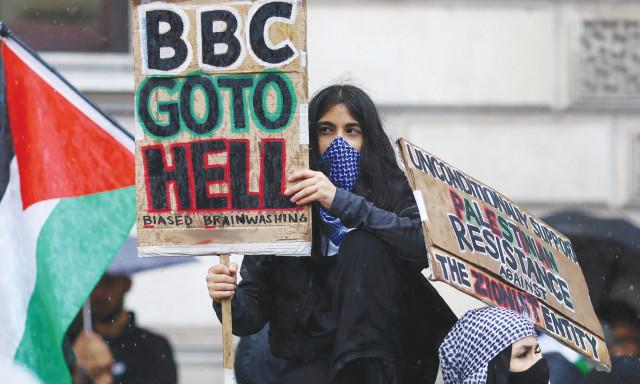
BBC sees Israeli lives more worthy than Palestinians: Journalists accuse BBC of favouring Israel
text_fieldsLondon; In a letter penned by eight anonymous journalists working for the BBC and shared exclusively with Al Jazeera, serious allegations of biased reporting on the Israel-Hamas conflict have come to light.
The journalists accuse the BBC of a double standard in portraying the conflict, claiming that the broadcaster invests more effort in humanizing Israeli victims than Palestinians and omits crucial historical context.
The letter, spanning 2,300 words, contends that the BBC's coverage perpetuates a "double standard in how civilians are seen," with a particular focus on the alleged disparity in reporting Russian war crimes in Ukraine compared to the Israel-Hamas conflict.
The journalists express concern that the BBC's editorial stance fails to accurately depict the unfolding human rights abuses in Gaza, emphasizing the rising death toll, which currently exceeds 14,500 Palestinians, including at least 6,000 children.
The conflict began when Israel declared war against Hamas following an attack by the Palestinian group on southern Israel, resulting in the death of approximately 1,200 Israelis and the hostage-taking of over 200. The letter criticizes the BBC for framing Hamas as the sole instigator and perpetrator of violence, using terms like "massacre" and "atrocity" exclusively for the Palestinian group.
The journalists argue that the BBC's coverage has been inconsistent in humanizing Palestinian civilians, with a perceived lack of effort to tell their stories. They claim that while individual Israeli victims are highlighted, the same level of empathy is not extended to Palestinians.
The letter alleges a hierarchy in considering civilian lives, stating that Israeli lives are deemed more worthy than others, particularly impacting people of colour among the BBC staff.
Furthermore, the journalists assert that the BBC fails to provide crucial background information about Israel's occupation and the historical context of Palestinian suffering, such as the Nakba. They criticize the absence of critical historical context in news updates and articles, accusing the BBC of neglecting the asymmetric death toll across decades.
The BBC, responding to the allegations, denies the claims of biased reporting. A spokesperson emphasizes the BBC's efforts to highlight the human cost to civilians in both Gaza and Israel, noting that the broadcaster has journalists on the ground in Gaza providing firsthand testimony from civilians, doctors, and aid workers.
The letter from its own journalists adds to a growing list of challenges, including criticism from the UK Defense Secretary for describing Hamas fighters as "militants" rather than "terrorists." The BBC's embedded reporting with the Israeli army has also drawn scepticism from media experts, with concerns raised about one-sided narratives.
The fallout extends beyond the BBC, with global newsrooms experiencing internal divisions. Journalists from different publications have resigned, citing disillusionment with editorial stances and coverage of the conflict.























